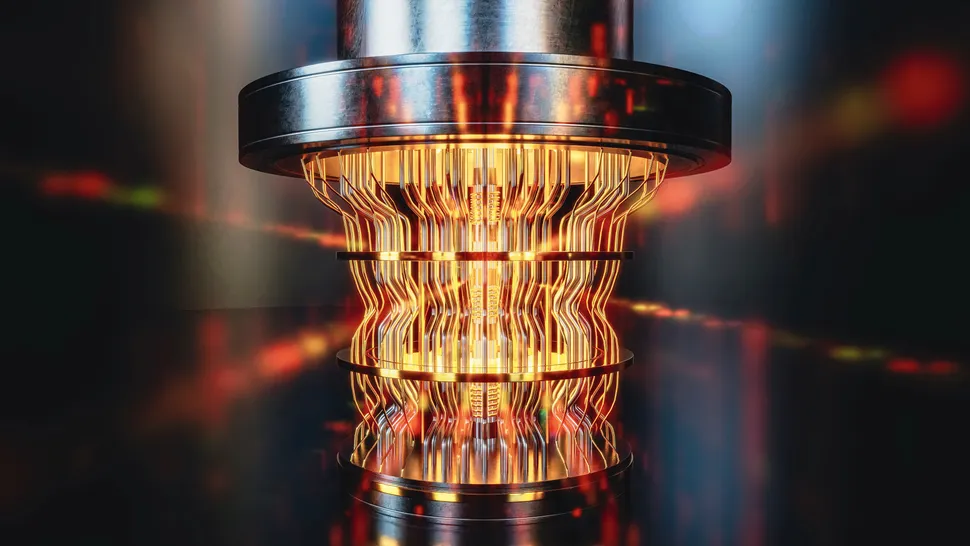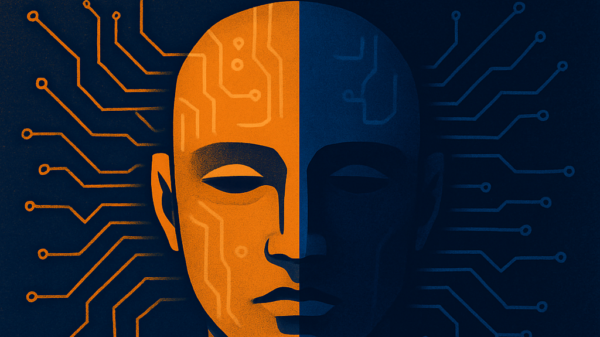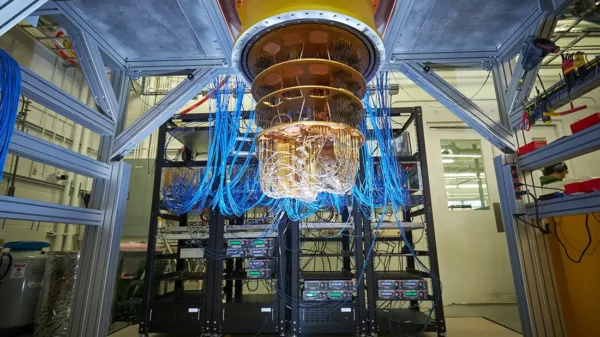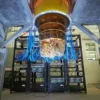The recent craze regarding artificial intelligence and the quasi-arms race that has spawned from such has drawn a fair amount of fear and froth down from governments and companies alike. The Americans in particular look at this week’s revelation of China’s very own high grade AI, DeepSeek, as being on par with the sputnik incident in the 1950’s that frightened Americans literally to the moon and back.
According to a recent article by The Guardian, Google’s new quantum microchip, Willow, can complete tasks in five minutes that would take conventional computers 10 septillion years. It’s not far from there to the suggestion that the next generation of artificial intelligence may be supercharged by quantum computing, This is a high science-fiction concept involving quantum mechanics and the ability to crack any lock at any time from anywhere. Except it’s not quite like that and it’s not quite ready yet.
Earlier this month NVIDIA’s CEO Jensen Huang took aim at quantum computing and quantum stocks in particular at the world’s largest trade show, CES 2025, when he said it would be a long time before quantum computers were actually useful for something.
In response, business intelligence firm, Global Quantum Intelligence co-founder and chief content officer, Doug Finke, added some nuance.
“I’m thinking that by truly useful he meant a time that quantum computers would have the same impact on society that (Nvidia) GPUs have today. If that’s what he meant then maybe 20 years is correct,” Finke said.
“But some in the industry read his comments as meaning quantum computers would be totally useless over the next 19 years and that’s definitely not the case.”
D-Wave Quantum Inc. (NYSE: QBTS), for example, is telling people they have a handful of products in production.
As of January 2025, several companies are actively developing and commercializing quantum computing technologies. Here are five notable examples.
IBM
IBM (NYSE: IBM) is a leader in quantum computing, focusing on superconducting qubits.
Their latest processor, Condor, boasts 1,121 qubits, marking a significant milestone in quantum computing scale. IBM has also introduced the Quantum System Two, a modular quantum computer designed for parallel circuit executions and quantum-centric supercomputing.
The company’s extensive software ecosystem, which includes Qiskit and quantum serverless computing, aims to make quantum computing more accessible to developers and researchers. Furthermore, IBM’s quantum roadmap extends to 2033, with plans for a 100,000-qubit system and the development of error-corrected logical qubits.
IBM is also at the forefront of building quantum-secure cybersecurity solutions to protect against the vulnerabilities posed by quantum computing. The company’s initiative, IBM Quantum Safe, offers a comprehensive suite of technologies and services to help organizations transition to quantum-safe encryption and modernize their cybersecurity infrastructures.
IBM recognizes that quantum computers, once fully developed, could break current cryptographic standards like RSA and ECC. These underpin much of today’s digital security. To address this, IBM has developed quantum-safe cryptography that resists attacks from quantum computers. These cryptographic algorithms are integrated into products such as the IBM z16 systems. These enable businesses to adopt quantum-resistant encryption as part of their data protection strategies.
Beyond technology development, IBM is preparing organizations for the quantum era through its Quantum Safe Transformation Services. These services guide businesses in identifying cryptographic vulnerabilities, which include adopting quantum-safe protocols. They also include automating the transition to ensure a seamless implementation of quantum-resistant measures.
Additionally, IBM actively contributes to the standardization of quantum-safe algorithms through its involvement with the National Institute of Standards and Technology (NIST) and its ongoing support of open-source initiatives. By collaborating with industry leaders and organizations, IBM ensures that its quantum-safe solutions meet the highest security standards.

Google’s Willow microchip. Image via Alphabet.
Alphabet Inc (NASDAQ: GOOG), which is Google’s parent company, has been a significant player in quantum computing research and development. The company has made notable advancements, including the development of quantum processors and algorithms. Google’s Quantum AI division focuses on building quantum processors and developing novel quantum algorithms to achieve quantum advantage in real-world applications.
In December 2024, Google unveiled “Willow,” a groundbreaking quantum chip that has set new standards in the field of quantum computing. This 105-qubit processor demonstrated the ability to solve computational problems in under five minutes. Normally, these are tasks that would take the most advanced supercomputers an estimated 10 septillion years to complete.
A particularly notable achievement with Willow is in quantum error correction. This is important because errors in quantum computations have historically limited scalability and accuracy, but Google’s work with Willow has surpassed a critical threshold in error correction.
This means that as the system scales, errors are exponentially reduced, bringing practical, large-scale quantum computing closer to reality. This breakthrough lays the foundation for future quantum systems that could process vast amounts of data with unprecedented precision.
Google’s Quantum AI team is advancing hardware capabilities and is also deeply engaged in developing quantum algorithms and software tools. These innovations have potential applications in cryptography, material science, and optimizing complex systems.
IonQ
IonQ Inc (NYSE: IONQ) specializes in trapped-ion quantum computing technology. Their focus on trapped-ion quantum computers, with all-to-all qubit connectivity, ensures high-quality quantum states. This unique connectivity approach sets IonQ apart as a versatile player in quantum computing, pushing advancements in areas like quantum chemistry and cybersecurity.
The company first hung its shingle in 2015 with its key raison d’etre being the development of general-purpose quantum computers. Headquartered near the University of Maryland, IonQ uses its proximity to academic institutions to foster innovation and collaboration.
IonQ is also making significant strides in quantum chemistry. In November 2024, the company announced advancements in hybrid quantum computing by integrating its hardware with NVIDIA’s CUDA-Q platform.
This breakthrough enables scientists access to stronger computing abilities, particularly in molecular modeling. Furthermore, greater speed and accuracy is critical for understanding chemical reactions and creating new materials.
What the hell is Quantum chemistry?
Quantum chemistry is the application of quantum mechanics to study the behaviour of atoms and molecules at the smallest scales. Quantum chemistry enables scientists to model complex reactions, design new materials, and discover advanced pharmaceuticals, by simulating chemical processes and interactions.
It’s used in energy storage to help develop more efficient batteries, and in drug development, where it accelerates the creation of novel therapies.
IonQ’s focus on quantum chemistry is exemplified by its partnership with Hyundai Motor Company to develop algorithms that study lithium compounds and battery chemistry.
Read more: D-Wave Quantum’s new program gives enterprise access to quantum optimization tools
Read more: Palo Alto Networks collaborates with fellow travellers to prepare for quantum threats
D-Wave Quantum
D-Wave was founded in 1999 and is based in Burnaby, British Columbia, Canada.
It became the first company to sell a commercial quantum computer in 2011. D-Wave specializes in something called quantum annealing.
Think of it like solving a puzzle. The quantum computer mixes many possible solutions together (this is called “superposition”) and then gradually narrows them down to find the best one, like identifying the lowest point in a landscape. This approach works especially well for problems that require finding the best combination of many options, such as optimizing a schedule, studying materials, or improving machine learning models.
The company’s focus is primarily on developing and selling quantum annealing based computers. It’s been enough to gather itself a reputation as a pioneer in providing quantum computing. The company has also since developed several generations of quantum processors and offers cloud-based access to their quantum systems.
On January 22, 2025, D-Wave introduced the Leap Quantum LaunchPad program, designed to fast-track the deployment of quantum computing applications.
This initiative aims to boost adoption across various industries by providing businesses and researchers with the tools, computing power, and guidance required.
The program actively tries to reduce barriers to entry, thereby enabling the swift transition from experimentation to real-world deployment. This could unlock the potential of quantum computing for complex problem-solving.
Read more: Four researchers aim to democratize quantum computing research
Read more: Arqit Quantum shares bounce 25% after 25:1 stock split
PsiQuantum
PsiQuantum is a quantum computing company headquartered in Palo Alto, California. It was originally founded in 2016 by a coalition of researchers from the University of Bristol and Imperial College in London.
The company aims to build the world’s first utility-scale, fault-tolerant quantum computer using a photonics-based approach. Unlike other quantum computing methods, PsiQuantum uses photonic qubits—particles of light—to process information. By using existing semiconductor manufacturing infrastructure, the company hopes to scale its quantum systems more efficiently and reliably.
In April 2024, PsiQuantum announced plans to construct a large-scale, fault-tolerant quantum computer near Brisbane Airport in Australia, backed by a AUD$940 million investment from the Australian and Queensland governments. The company expects the system to be operational by the end of 2027.
Meanwhile, in July 2024, PsiQuantum also partnered with the state of Illinois to build a 300,000-square-foot Quantum Computer Operations Center on Chicago’s South Side.
Fault tolerance in quantum computing refers to a system’s ability to continue functioning even when errors occur. Quantum computers are extremely sensitive to environmental noise, which can introduce errors and corrupt calculations. A fault-tolerant quantum computer can detect and correct these errors without losing information, making large-scale, reliable quantum computing possible.
This facility is part of the Illinois Quantum and Microelectronics Park initiative. PsiQuantum has raised over $1 billion in funding and is working on quantum applications across industries like finance, healthcare, and artificial intelligence.
PsiQuantum aims to have its first utility-scale, fault-tolerant quantum computer operational by the end of 2029. The company has emphasized that achieving this goal depends on continued advancements in photonic qubit technology and leveraging existing semiconductor manufacturing capabilities.
.
Follow Joseph Morton on Twitter
joseph@mugglehead.com














